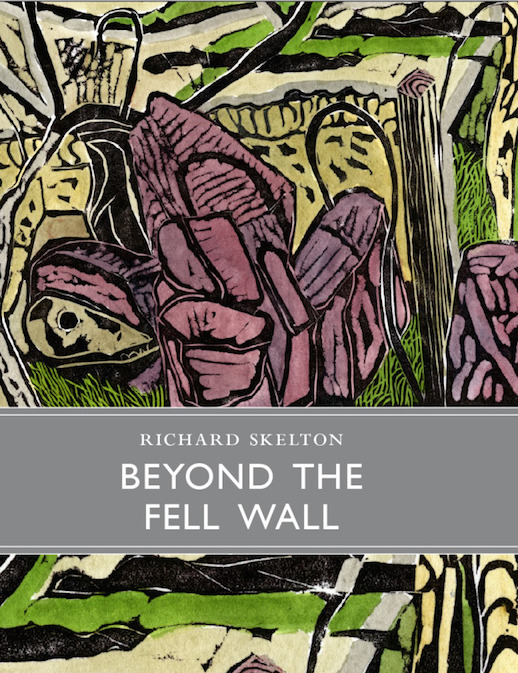 Beyond the Fell Wall
Beyond the Fell Wall
by Richard Skelton
Little Toller Books. Hardback, 184 pages. Out now.
Review by Sue Brooks
Richard Skelton has described his work as “a sequence of invocations on universal themes including conversations with non-human persons – the community of others who comprise the living landscape.” Taking part as a reader or listener can be a disturbing experience. Language and landscape become interchangeable, mind-altering. Only by entering repeatedly with care and attention can there be any understanding.
Beyond The Fell Wall is the most recent in the sequence which began in 2011, when he and Autumn Richardson were living in a remote cottage in W. Cumbria. This year they have moved on: their work there having come to an end. But there is no sense of work being “finished”. The process remains unchanged and ever changing, one giving birth to another. The present incarnation covers ground familiar from earlier publications, such as Wolfhau and Memorious Earth, but with a profoundly different focus.
It was a while before I could grasp why I found this book so unsettling.
The making of a wall: stones added to stones.
Place your thoughts with them. Release them. Let them be gradually laid to rest.
The first time I reached this point on the penultimate page, I could find no rest. Back to the beginning then, where the wall is a lure, a line cast into my waters, it worms up the fell side and over into the beyond, and I am hooked. Back to the beginning more than once, knowing that I too, was hooked – and floundering. I opened the book at random – There are certain places, conjunctions of line and contour, where thoughts settle and cohere, and equally there are other places in which the same thoughts come undone and fall apart. I seemed to be approaching the Beyond and drawing back, turning and straying further off the path.
On another occasion I hold the book in both hands. (It’s only a book…) It is small and beautifully proportioned. The jacket is water-coloured in greens, yellows and black with a surreal cairn of large stones in the foreground, leaning over the profile of an animal skull. Grass is growing on the near side of the wall and on the far side a four-legged creature stands patiently. I open the book, slowly, attentively, and something changes. Less resistance perhaps, more openness, a sense of entering. And I notice for the first time how the words appear on the blank pages. For Autumn on the first, the wall is a lure…on the third, a total of 38 on the fifth, 54 on the seventh. The body of the text, marked by Roman numerals, starts on the thirteenth. It all feels absurdly significant, as though I am taking part in an important ritual.
I began to see the structure, the intricacies of the composition. How the first two poems – 38 words and 54 respectively – give birth to the five that follow, words like seeds that take root in a new place: clear, subtle,rest,laying,drawn,balance,ornament, stolen,beyond. Or – the foundation stones of a wall. The poems as Shiners and Jumpers, the prose passages as Heartings and Copings. A new vocabulary is needed for this wall building. It appears as summoned: Towards a Lithical Vocabulary 1-111 from the Greek logos (stone). The words arranged on the page to create wall-spaces, according to size and meaning.
In this ritual there are invocations and acts of propitiation. They take the form of list-poems of field names, carefully selected and arranged to echo the poem or passage which precedes them – the appeasement of spirits, meadow stones, hermetic marks. And voices from beyond the pale. Things fall apart and are reassembled. Is there a glimmer then, of something older – some remnant of profane, beautiful knowledge lodged within the wall’s foundations? It feels like a turning point. The mood lightens; there is drift and shift. Samhain approaches as I write – the night when the veil between the worlds is at its thinnest – and I find myself, as the ritual nears its end, chanting the last poem under my breath: work the line/laying stones/somewhere the wall/comes down/is drawn in/ made subtle.
When I come once more to the penultimate page:
The making of a wall: stones added to stones
Align yourself with them
Place your thoughts with them. Release them. Let them be gradually laid to rest
With others
it feels right to do so with the utmost reverence.
I know of no other author, musician, composer, film-maker whose work touches on alchemy in this way. Most of it has been issued on Richard and Autumn’s own labels – Sustain-Release or Corbel Stone Press. Thanks must go to the admirable Little Toller Books who invited Richard to contribute to their monograph series, the brief being “an object of their fascination through which to tell us wider stories about the British Isles.” Deeper, beyond the beyond stories, and an opportunity to reach a wider reading public.
Richard Skelton will be discussing ‘Beyond the Fell Wall’ with Radiohead’s Colin Greenwood at our Bush Hall event on 15 November. More information and tickets here
‘Beyond the Fell Wall’ is available in the Caught by the River shop